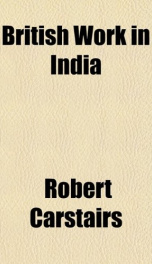british work in india

Purchase of this book includes free trial access to www.million-books.com where you can read more than a million books for free. This is an OCR edition with typos. Excerpt from book: CHAPTER III. THE PEOPLE. The statesman who has to reckon up his forces ; to decide what he will do, and on what means he can count for doing it, looks on the people, studies the peoplethe men and women living in the Stateat once his problem and its solution. The will, the energies of the people, form the forces which, according as they are guided in harmony for good purposes, or get into confusion and clash, give the State prosperity or weakness Before we consider British work in India, we must form a distinct idea of the peoples of India among whom it is to be carried on. To hear some politicians talk, one would think that it matters little what the people are like, so long as they have good institutions. The magic spell of the suffrage or the representative assembly can transform the peoples in India into a second edition of the people inEngland. In the opinion of others, again, the people arc well enough without institutions. Both sides are, in a way, right, and both are wrong. The people are the material, and the institution is the shape. For the making of a good steel sword we need good material, and Ave also need a good shape. The civilised society is the shapen material. We must suit the shape to the material if we are to have a successful result. Let us, then, learn about the people, before we begin to say what is good for them. Before entering on a study of the peoples of India, it will be profitable to call to mind of what stuff and in what shapes are the people of Great Britain. The British nation have got so much accustomed to themselves that they sometimes forget that all the world is not like them. It is undoubtedly the stuff of the people that has determined their shapes, rather than the shapes that have made the stuff, j Of what stuff, then, are the Brit...
Info about the book
Author:
Series:
Unknown
ISBN:
1130896498
Rating:
3.5/5 (4)Your rating:
0/5
Languge:
English
Users who have this book
Users who want this book
What readers are saying
What do you think? Write your own comment on this book!
write a commentGenre
if you like british work in india try:
Other books by this author
Do you want to exchange books? It’s EASY!
Get registered and find other users who want to give their favourite books to good hands!


